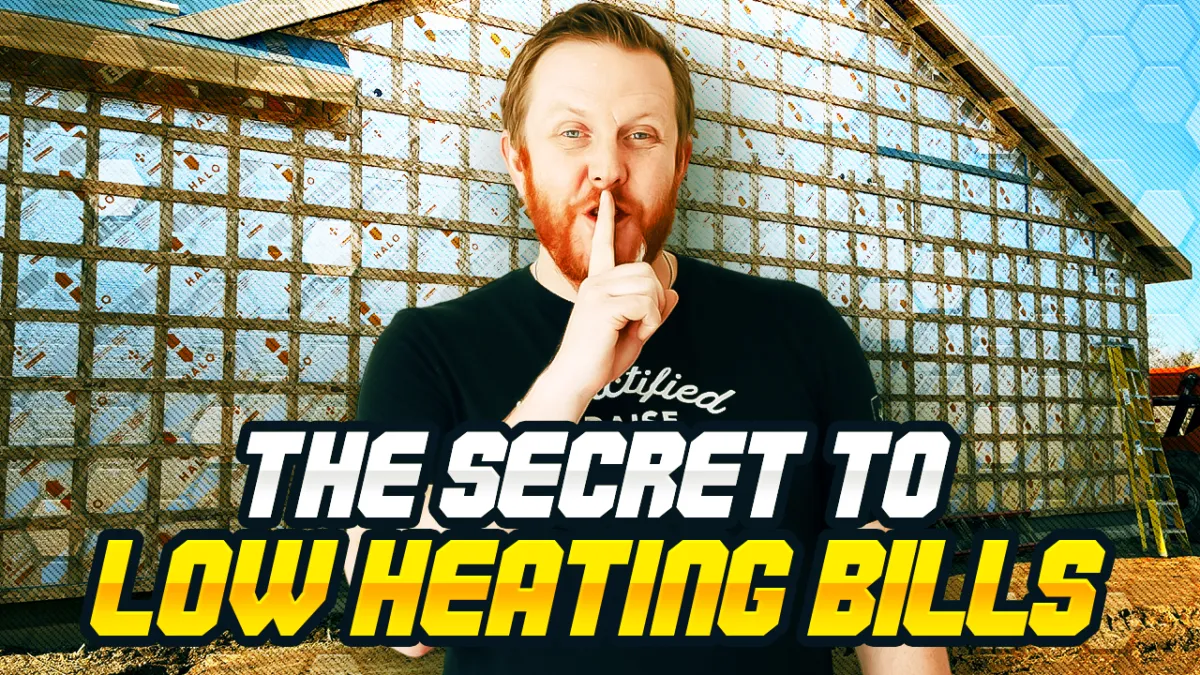
Exterior Insulation 101: The Key to a Warmer More Efficient Home
Hey Everyone, TJ here with Sanctified Homes and Construction, and today, we’re diving into the topic of exterior insulation. Specifically, why wrapping your home in a layer of exterior insulation is one of the smartest choices you can make for energy efficiency, comfort, and long-term durability.
Let’s talk about how this extra layer acts as a protective blanket for your home, improving its performance and saving you money in the long run.
Why Exterior Insulation Matters
When you build a home, you’re essentially creating a barrier between the indoor and outdoor environments. But the traditional approach to insulating—focusing only on the space between the studs—leaves gaps in that barrier, known as thermal bridging.
What is Thermal Bridging?
Thermal bridging occurs when heat escapes through materials that aren’t insulated, like the wooden studs in your walls. Even if you use high-quality insulation inside the walls, those studs can become highways for heat loss, especially in colder climates like Wisconsin.
Adding an exterior layer of insulation helps to:
Minimize thermal bridging
Create a more consistent indoor temperature
Improve your home’s overall energy efficiency
Think of it this way: When it’s freezing outside, you don’t just layer t-shirts under your sweater. Instead, you grab a thick, insulated jacket to trap heat across your entire body. That’s what exterior insulation does for your home.
How Exterior Insulation Works
A Continuous Blanket of Protection
By wrapping your home in exterior insulation, you’re essentially adding a continuous thermal barrier. At our Bushel Hill Haven project, we’re using the Halo Exterra GPS foam for this purpose. This graphite-infused foam provides an R8 insulation value and integrates seamlessly with the rest of the home’s energy-efficient design.
It’s Not Just About the Cold
Exterior insulation isn’t only for cold climates. In warmer regions, foil-faced insulation can reflect radiant heat, keeping your home cooler during scorching summers. This makes exterior insulation a versatile solution for all climates.
Code Compliance and Building Trends
Exterior insulation is quickly becoming the standard across the country. The 2023 International Building Code recommends specific amounts of exterior insulation for different climate zones. For example:
Cold Climates: Homes may require up to an R20-R25 exterior insulation layer, depending on the interior insulation used.
Hot Climates: Even in warmer regions, adding exterior insulation helps reduce heat gain and improves efficiency.
These updates are based on proven science and are pushing builders toward creating longer-lasting, more comfortable homes.
How We Install Exterior Insulation
At Sanctified Homes, our installation process is designed for both performance and durability:
Prep the Surface: We ensure the wall surface is clean and ready for the insulation panels.
Install Insulation Panels: Panels are locked together to create a seamless, airtight layer.
Seal Seams and Edges: Using high-quality tape and caulking, we seal all gaps to prevent air leakage.
Flash and Air Seal Windows and Doors: Proper detailing around openings ensures the integrity of the insulation layer.
This method not only improves energy efficiency but also reduces the risk of moisture intrusion and drafts.
The Benefits of Exterior Insulation
Energy Savings: By reducing heat loss in the winter and heat gain in the summer, you’ll spend less on utilities.
Increased Comfort: Say goodbye to cold drafts and uneven room temperatures.
Improved Durability: Protect your home’s structure from temperature fluctuations and moisture damage.
Environmental Impact: A more efficient home reduces your carbon footprint.
Final Thoughts
Exterior insulation is an investment in your home’s future. It ensures that you’re not just meeting today’s building standards but exceeding them for years to come. At Bushel Hill Haven, we’re showcasing how this approach creates a stronger, healthier, and more efficient home.
If you’re considering building or remodeling, or just want to learn more about exterior insulation, feel free to reach out. We’re always happy to answer questions and help you make informed decisions.
Don’t forget to like, subscribe, and share for more insights into building better homes. And as always, don’t forget to raise your standard!

Home Building Checklist
We understand that the process of building comes with a lot of decision-making. So we created the Home Building Checklist to guide your decision-making process, and it's yours for free here!

The Blessed to Build Foundation is a 501(c)3 Non Profit providing education & resources to help homeowners and home builders make informed choices about building homes that last.
Dane County, Wisconsin
Hire a Builder
If you are looking to build a new home in the following cities, connect with Sanctified Homes & Construction to start the conversation.
Copyright Blessed to Build Foundation, Inc. 501(c)3

